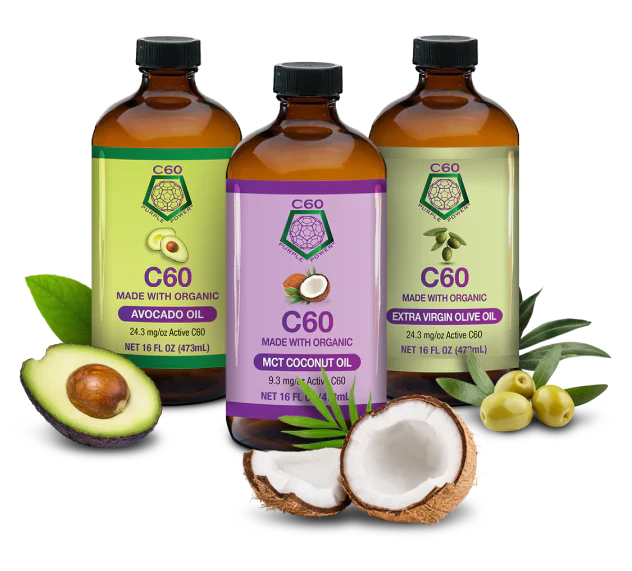Get a Free box of Gummies ($120 value) when you spend $200 or more. Now through Monday
We present all the
“C60”, short for Carbon 60, is a molecule made up of 60 tiny carbon atoms. C60 is also known as buckminsterfullerene, and is often referred to as a “buckyball”.
— George T.
C60 is a recently discovered, Nobel-Prize winning molecule, that looks similar to a cage-like soccer ball. C60 is found in nature and in the atmosphere of giant red stars. It is considered to be one of the most powerful antioxidants known.
C60 is characterized as a free-radical sponge and works at the cellular level by lifting the oxidative burden. C60 helps to optimize mitochondrial function by enhancing energy production in the cells. Most people note an increase in energy and mental clarity after consuming C60 on a daily basis for 30 days or more.
People use C60 to support their overall well-being in many ways. Many people are interested in C60’s ability to help optimize mitochondrial function, and its ability to promote a balanced immune response.
People who are noticing age-related memory loss appreciate C60, especially for its ability to promote energy and mental clarity. Many athletes note benefits to performance and decreased recovery times. C60 may promote skin vitality and hair growth and may lessen the appearance of fine lines and wrinkles when applied topically. People also use C60 for their pets to support longevity, a healthy immune response, and overall wellness.
C60 has been proven to be beneficial for both people and animals, including our beloved pets. There is a tremendous amount of information available about C60 and its benefits in everything from scientific research papers to real-person testimonials.
However, as a manufacturer, there are restrictions on what we can say on this website. If you would like more information about human studies completed on C60, please visit our research page.

The US Food and Drug Administration currently prohibits all manufacturers of C60 products from making any claims about their ability to treat specific health conditions. Health claims are only permitted where approved by the FDA and based on accepted clinical trials.
C60 is not a drug and it is not intended to diagnose, treat, cure, mitigate, or prevent any disease.
Because C60 is relatively new to the market, the lengthy clinical trial period is still in process. We wish we could say more because we’re incredibly proud of what we do. We hear stories on a daily basis, from people all over the world, who have shared with us how C60 and C60 Power products have changed their lives.
As a company founded by a biogeochemist and research scientist, safety, purity, quality, and compliance with regard to manufacturing standards and agency regulations are a top priority for us. We’re confident our strict standard operating procedures and manufacturing processes will help to distinguish our high-quality products from lower-quality alternatives.
We encourage our customers to search online for additional C60 research available on the internet as well as personal testimonials of many thrilled customers.
Or join our loyal community of customers and give C60 Power a try today! Either way, we know you’ll be delighted by what you discover.

